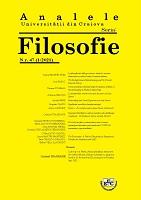LA TEMPORALITÉ COMME STRUCTURE DU POUR-SOI CHEZ SARTRE
TEMPORALITY AS STRUCTURE OF THE FOR-ITSELF IN SARTRE
Author(s): Adriana NeacşuSubject(s): Contemporary Philosophy, Existentialism
Published by: Editura Universitaria Craiova
Keywords: time; temporality; ek-stases of temporality; past; present; future; temporalization;
Summary/Abstract: This study analyzes Sartre's conception on temporality, which the philosopher considers as “an organized structure” so that past, present and future are “structured moments of an original synthesis”. For Sartre, temporality is not a universal time, containing all beings, but the way of being of for-self: a being always at distance from itself, since it is never in mere identification with itself. Since for-self is inevitably forced to come out of itself in order to reach itself, the nothingness its own structure. Therefore, the being of for-self is, in the same time, behind and in front of for-self, so for self is the being that is not what it is, and is what it is not. There are three ways of being away from itself, which Sartre calls ek-stases: not to be what you are – that is ek-stasis of past, to be what you are not – that is ek-stasis of future, and to be what you are not, and not to be what you are – which is ekstasis of present. In conclusion, temporality comes into the world through for-self, representing the intra-structure of being which is its own nothingness. Without for-self, which is nothingness and pure spontaneity, temporality would not exist.
Journal: ANALELE UNIVERSITĂȚII DIN CRAIOVA. SERIA FILOSOFIE
- Issue Year: 1/2021
- Issue No: 47
- Page Range: 89-109
- Page Count: 21
- Language: French

